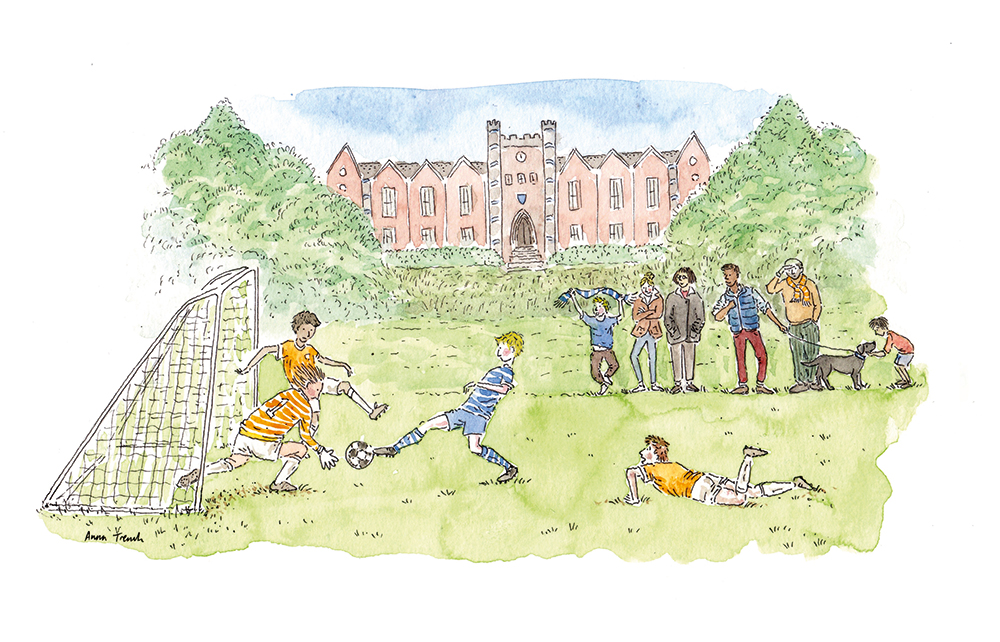On a wet and windy afternoon at Repton School, technical director of football Luke Webb is putting his first team through their paces. At first glance this training session looks much the same as any other, but I soon start to spot some subtle yet significant differences in his approach.
Webb keeps his distance, there’s no shouting from the touchline, yet all his players seem to know exactly what to do. They start off with close passing drills, then move into small-sided games, and finish with an exercise designed to hone the low driven cross – a delivery all defenders dread.
Webb teaches players to play with freedom, to be less risk-averse
Afterwards, there’s no big team talk. Instead, as the boys pack up the balls and cones, he chats to them one-on-one, quietly. It’s unobtrusive, but still waters run deep. He’s a coach and a communicator of enormous expertise, and during the past decade his methods have produced spectacular results. As he tells me, when we sit down together: ‘I’m challenging the status quo.’
The status quo is that at 16, gifted young footballers must make a choice – between academic and sporting excellence, between a school sixth form and an apprenticeship at a football club. Webb rejects that notion. ‘Young people can perform and learn at the absolute highest level of the industry while still being at school,’ he says, and my own experience bears this out.
I first met Luke Webb eight years ago, when he was director of football at Bradfield College. My son Ed had played for Watford FC since he was eight, but meningitis had knocked him back, and when he was 16 he was ‘released’. A couple of other clubs had shown an interest in taking him on as a ‘scholar’ – a two-year apprenticeship where players train and play full-time, alongside some academic study, but I could tell that Ed felt torn. Being a ‘scholar’ at a pro club, he’d find it hard to do the sort of study which would get him into a Russell Group university. Going to a regular school for sixth form, he’d find it hard to carry on playing football at the elite level he was used to.
And then Watford put us in touch with Webb, who offered Ed a football scholarship at Bradfield. Ed decided to accept. I was thrilled he’d be going to such a fine school, with such excellent facilities, but I doubted any boarding school could improve his footballing prospects. I was wrong.

Under Webb, Ed blossomed. He captained the Independent Schools national team, won the Independent Schools FA Cup with Bradfield, and landed a professional contract with Burnley FC. He only spent a year at Burnley (many are called but few are chosen) but that pro contract, plus the three A levels he took at Bradfield, got him into Loughborough University, where he’s now reading maths and playing semi-pro. OK, so he didn’t hit the big time, but he’s making decent money playing at a good level while doing a BSc at a top university, a combination I never thought he’d be able to achieve.
But what Webb did for Ed wasn’t just to marry football and academia. He taught him there was more to life than sporting or academic excellence – that success (or setbacks) in those two fields shouldn’t define your sense of who you are. Sure, winning is important, but we all have far more to offer, to our families, friends and teammates. Without this wider sense of our true worth, sporting triumph (always fleeting) will be a castle built on sand. ‘I’m an educationalist, and my vehicle is football,’ he says. ‘What I am trying to achieve is to help these young people become courageous and excellent so that they are in complete control of their decisions and their lives.’
Webb does a lot of stuff that coaches do in professional football clubs: strength and conditioning, analysis, sports psychology. He also lays on more eclectic activities, such as boxing, dance and yoga. He takes players out of their comfort zones. He teaches them to play with freedom, to be less risk-averse. Several Bradfield pupils subsequently landed pro contracts at top clubs, but even average players improved tremendously under his tutelage. He honed their technique, but above all he taught them to read the game.
‘I study the truth of the game,’ he says, and for him, the fundamental truth is that football is all about space – finding space, making space, for yourself and your teammates. In his meticulous coaching manuals, which he never stops refining and updating, he’s developed this quest for space into a fine art.
Football is a complex sport, with an infinite array of outcomes. Webb’s approach makes it simple and enjoyable, for players of every ability. ‘You don’t have to be elite to access excellence. You could be an Under-14 F team player and progress to the Under-14 E’s. That is an example of excellence.’
Now, after 15 years at Bradfield, he’s moved on to Repton, another school with a fine football tradition (the Old Reptonian Will Hughes played for Derby County and Watford and is now at Crystal Palace). Will he achieve similar results there? It’s still too soon to say, but I was intrigued to hear his plans, which is why I’ve travelled to Derbyshire to ask him about his unique approach to coaching, and the events that defined his attitude to the beautiful game.
Webb was born in 1986 in Nottingham. His father, Neil, played for Nottingham Forest under Brian Clough, for Manchester United under Alex Ferguson, and 26 times for England. Webb inherited his dad’s talent. For any gifted young player, having a famous footballer as a father can be a mixed blessing, but Neil was encouraging rather than controlling. Always sparing with his advice, he allowed Luke to find his own way.
‘My dad, when he used to come to watch, would stand 30, 40 yards back from the touchline. I knew he was there, but he was never on the touchline. He’d never say anything from the touchline – he was too far away.’ It was the same story after the game. ‘He’d never give me feedback unless I asked him.’ And if Webb did ask? ‘He would just give me one amazing gem – probably something he learnt from Brian Clough.’
Luke was signed up by Arsenal at 11 and played alongside Cesc Fàbregas as a teen. When he was an apprentice, the first team were ‘The Invincibles’ – the Arsenal squad who won the league without losing a single game. ‘I’m so thankful for that experience,’ he recalls. ‘Probably one of the best teams of all time, and I got to actually see what that looked like, a yard away, and participate in it.’ That experience still shapes his coaching. ‘I coach exactly the same things, but just at a slower pace. That’s the only difference.’
Released at 18 (the vast majority of youth players at any big club never make the first team), he went on to play for Coventry City and Hereford United before his career was cruelly curtailed by injury. ‘I was overplayed when I was at school,’ he says. ‘I played seven days a week from seven years old to 15.’
Even average players improved tremendously under his tutelage. He taught them to read the game
In his twenties, he acquired a BSc in Sports Science and Coaching at Roehampton University, and a Uefa A Licence coaching badge, and went to teach at Bradfield College, where he’d briefly been a pupil. There he developed his pioneering performance programme – a footballing curriculum which aims to give sixth-formers the same quality of coaching that they’d expect to find as full-time scholars in a professional football club, along with an academic curriculum commensurate with university entrance.
Webb believes boarding school is essential for this sort of programme. Boarding is totally immersive – no wasted time spent travelling between home and school and training. During term time, everyone is here together 24/7 – evenings and weekends. ‘It was an amazing experiment for me to see if it would work or not.’ And it did. Young players at pro clubs are always competing for the next contract. Pupils on his programme don’t have that pressure. They can focus on the process rather than the outcome. Some of his guiding principles sound closer to self-help than sport, but in fact these ‘growth mindset’ values have a practical application in football: support your teammates, respect your opponents, obey the referee.
Not many schools can boast a coach with Webb’s experience and skill set, but there’s still a lot that other schools could learn from him: creating an environment in which football is taken just as seriously as any academic subject, where pupils are inspired to play without fear of failure, to be competitive but also value long-term development over short-term gains.
It’s an attitude that’s growing. Bradfield and Repton both play in the Hudl League alongside seven other independent schools (Ardingly, Bede’s, Charterhouse, Hampton, Millfield, Royal Russell and Shrewsbury) which all play football to a similarly high standard. I haven’t seen their coaching, but I’ve seen their first teams in action, and you can tell from the way they play that they’re all heading in the same direction. Schools like these are taking school football to an entirely new level, and innovative coaches like Luke Webb are leading the way.






Comments